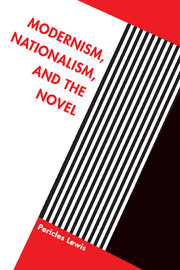Book contents
- Frontmatter
- Contents
- Acknowledgments
- Note on texts
- 1 The modern novelist as redeemer of the nation
- 2 The crisis of liberal nationalism
- 3 “His sympathies were in the right place”: Conrad and the discourse of national character
- 4 Citizens of the Plain: Proust and the discourse of national will
- 5 “Il vate nazionale”: D'Annunzio and the discourse of embodiment
- Conclusion
- Notes
- Select bibliography
- Index
1 - The modern novelist as redeemer of the nation
Published online by Cambridge University Press: 22 September 2009
- Frontmatter
- Contents
- Acknowledgments
- Note on texts
- 1 The modern novelist as redeemer of the nation
- 2 The crisis of liberal nationalism
- 3 “His sympathies were in the right place”: Conrad and the discourse of national character
- 4 Citizens of the Plain: Proust and the discourse of national will
- 5 “Il vate nazionale”: D'Annunzio and the discourse of embodiment
- Conclusion
- Notes
- Select bibliography
- Index
Summary
James Joyce's Stephen Dedalus, in A Portrait of the Artist as a Young Man, ends his diary entry for April 26 with a declaration that could stand as a motto for many of the novelists of his day: “Welcome, O life! I go to encounter for the millionth time the reality of experience and to forge in the smithy of my soul the uncreated conscience of my race.” The conjunction “and” in this little manifesto suggests the close but oblique relationship between the two goals the aspiring novelist has set for himself. The encounter with experience seems a deeply personal goal, while the forging of the conscience of the race has important political implications. Stephen links the personal and political goals by claiming that the forging will take place in the smithy of his soul. The problem that has faced many literary critics in interpreting Stephen's goal, as in understanding modernism more generally, has been that the quest for an authentic form of a pure, inner experience seems at variance with the desire to transform the race. If Stephen really wants to serve his race, then why does he leave Ireland and bury himself in books? Why not join the nationalist movement and fight for political independence? Or why not, at least, write a work that will rouse other Irishmen and women to political action?
- Type
- Chapter
- Information
- Modernism, Nationalism, and the Novel , pp. 1 - 51Publisher: Cambridge University PressPrint publication year: 2000



